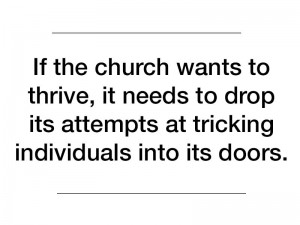This past summer and current school year, I have been given the opportunity to work at a local church, assisting with youth and adult ministries. So far the experience has been a good one, but it has got me thinking about the nature of “the church” and its role in society. Ultimately I believe the church as it stands is in dire need of re-imaging lest it slip further and further to the periphery of Western society.
The re- imaging of the church is not a matter of being relevant. It is not about trying to make your church as appealing as possible to the outsider in order to draw her in. This, unfortunately, is what many churches are resorting to these days. I see churches that meet in bars, advertising a nice cold pint while you talk about the moral issues of the day. I see churches where worship is akin to a rock concert. And of course there are the 15,000 person mega-churches where the 45-minute sermon reigns supreme. All the while the idea of sacrament has all but vanished from many of these institutions. We are a collection of individuals appealing to individuals.
imaging of the church is not a matter of being relevant. It is not about trying to make your church as appealing as possible to the outsider in order to draw her in. This, unfortunately, is what many churches are resorting to these days. I see churches that meet in bars, advertising a nice cold pint while you talk about the moral issues of the day. I see churches where worship is akin to a rock concert. And of course there are the 15,000 person mega-churches where the 45-minute sermon reigns supreme. All the while the idea of sacrament has all but vanished from many of these institutions. We are a collection of individuals appealing to individuals.
These attempts at a new church experience ultimately fail. After a while the new tactic stops attracting people and the church is left to find a new way to pull people in. If I were a member of one of these churches I would be infuriated because so much effort is spent on drawing people in that those who are already in the church are left to struggle their way on their own. Thus we are left with spiritually malnourished congregations and rapidly declining numbers in almost every one of the near 40,000 denominations.
So what do we do? Well, many have suggested that we have to start over, abandon our current traditions and become like the first century church. But the problem does not necessarily lie within our traditions; indeed I believe some of the answers are found exactly there. The solution is found in Jesus’ view of the family. For most they are familiar passages (Luke 14:26, Mark 3:31-35): Jesus repels his biological family and says that his followers are his real family. He even goes as far as to say that those who want to follow him must hate their family, turn and follow him.
I don’t think Jesus really means that we should hate our families; I think rather that he is emphasizing the importance of the church as a family. This is what we need to embody for the church to survive in our culture. I do not mean the church should be a family in the sense that we all feel close to one another only every Sunday when we gather. The term “family” does not mean simply that we have to tolerate each other. Reimagining the church as a family means that we meet like a family, interact like a family, care for each other like a family. It means that instead of church being a once-a-week thing, it is a lifestyle, founded on the sacraments. As Dean Jordan stated in chapel on Monday, church is not about the individual experience, it is about existing as a corporate body. The church should be a refuge against the anti-gospel veins in our culture, supplementing them with the words of Christ.
This is where my work at the local church comes in. They are a church that is on the right track. Worship is only every Sunday. The Lord’s Supper is celebrated every Sunday without exception and the church is grounded in the notion that we meet Our Savior every time we eat the bread and drink the wine. But the church does not stop there. Every other day of the week, the church is busy with parishioners coming and going, tending not only to the building but also to each other. The church building is a hub for all that is going on in the church community. People help supply each other with food, tools, service. It is not a group of people who are cordial to each other on Sundays. It is a group of people who live together, work together, play together and depend upon each other. That is what the church must be.
